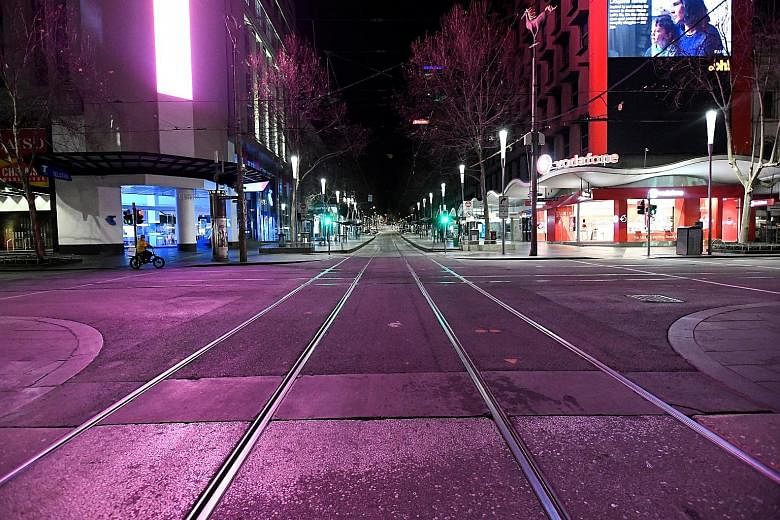The Australian state of Victoria is further tightening a strict lockdown in Melbourne, revealing plans to completely shut all non-essential shops and drastically scale back activities in major sectors such as construction.
In an announcement that will effectively shutter the economy in Australia's second-largest city, Victoria's Premier Daniel Andrews said yesterday that he was forced to impose "radical" measures for the next six weeks despite the severe impact on household incomes.
He told reporters: "These are heartbreaking decisions, but there is simply no choice. I know that there will be substantial pain… There is no choice but to do that damage to fix the health problem."
The plans were announced just a day after the state instituted tough new restrictions in Melbourne, including a six-week 8pm to 5am curfew that began on Sunday.
Mr Andrews said all shops will have to close from the end of tomorrow, except for those providing crucial services such as supermarkets, pharmacies, petrol stations, banks and post offices. Liquor stores have also been deemed crucial.
From the end of Friday, abattoirs and meatworks, the source of Covid-19 clusters, will reduce production by a third and will be subject to strict safety protocols.
Workers must wear gloves, gowns and masks like health workers, and have their temperatures checked and undergo regular testing.
In the construction sector, a major source of employment, large-scale building projects - those involving more than three storeys - will be allowed to employ only 25 per cent of their regular workers. At residential projects, a maximum of five people will be allowed on site.
Mr Andrews urged shoppers not to hoard goods, saying that the government is working with stores to ensure a steady supply of regular essential items. "You may not be able to buy every single item that you want in the quantities you normally would, but people will have everything they need," he said.
The city of Melbourne, with a population of five million, woke yesterday morning to an eerie silence after experiencing the new curfew.
Residents in the city are only allowed to leave the house alone, and for an hour a day. They cannot travel more than 5km from home and must go outside only for shopping, exercise, work or caregiving.
Schools will shut from tomorrow. Public transport services are also being restricted.
Yesterday, Victoria recorded a further 429 cases of Covid-19, down from 671 on Sunday. Thirteen more people have died, bringing the state's toll to 136.
Since the recent surge in Victoria, other states and territories have also been recording higher numbers of cases but have so far avoided uncontrollable outbreaks. Australia has so far recorded a total of 18,318 cases and 221 deaths.
Businesses in Melbourne will be entitled to two grants, totalling A$10,000 (S$9,780) each, for the current shutdown.
Nationwide, workers forced to self-isolate for 14 days will receive a "disaster payment" of A$1,500 if they do not have leave entitlements. Other reliefs include wage subsidies for workers at badly affected businesses.
Melbourne's rising case numbers have prompted New Zealand to delay plans for a trans-Tasman "travel bubble" between the two countries. New Zealand has had no community transmissions of the virus for more than 90 days.
New Zealand's Prime Minister Jacinda Ardern said yesterday that Australia would need to be free of community transmissions for 28 days before travel between the neighbours would be permitted.
She told The AM Show that the move "will be on the backburner for several months".
Victoria's Chief Health Officer Brett Sutton said yesterday that the strict new measures should result in lower infection rates in the next 10 to 14 days.
Mr Andrews said the measures were the "only way to get these numbers under control". If the measures did not work in six weeks, he said, they could be further tightened.
"We cannot continue to have 400 to 500 cases a day and so many people in hospital, so many people dying," he said.
"These are the tough calls that have to be made, otherwise we are not facing a six-week set of restrictions, we are in for a six-month strategy that I don't think will work."


